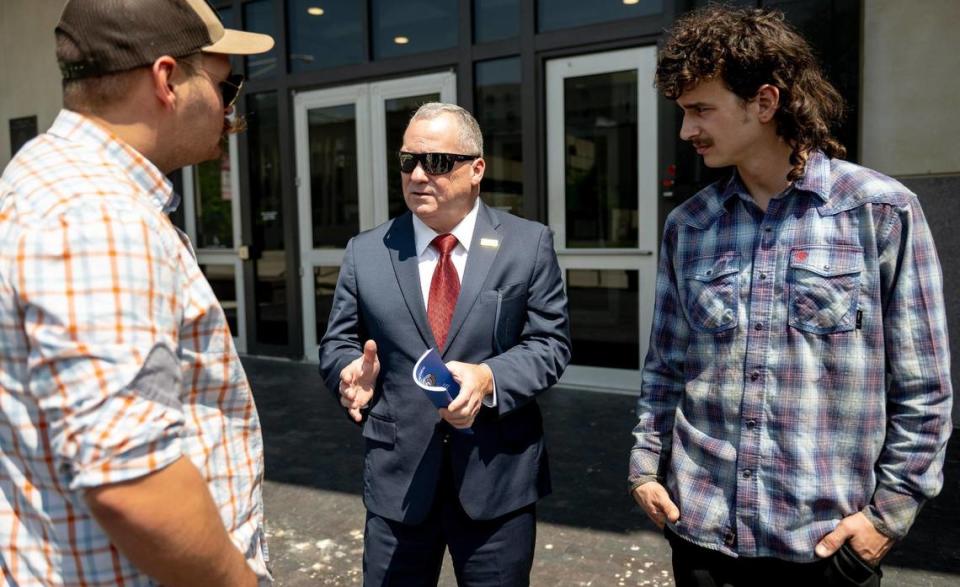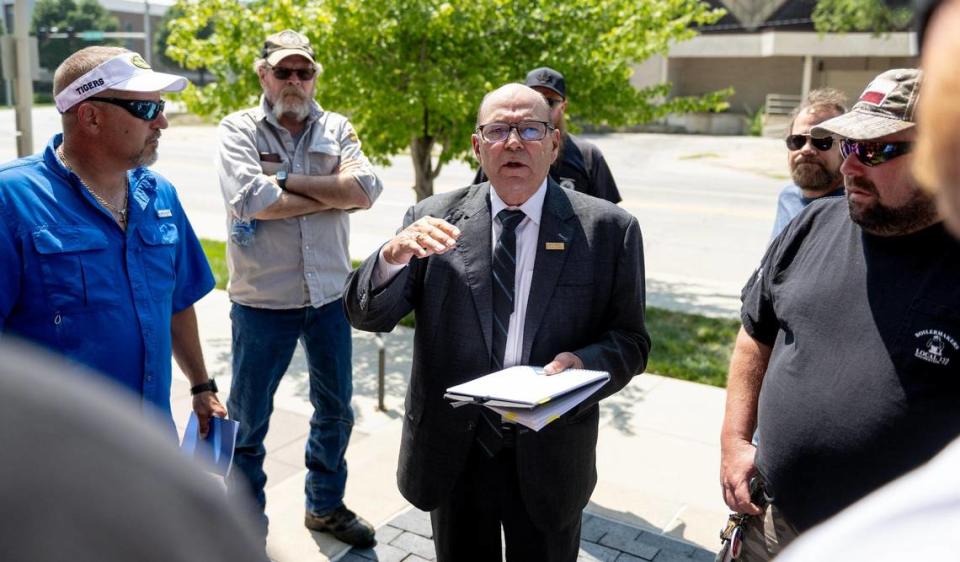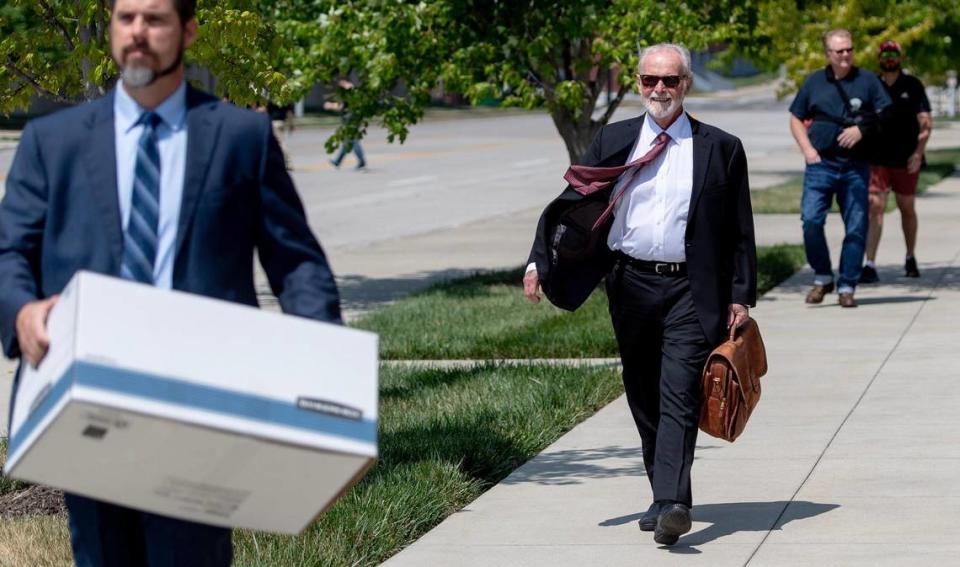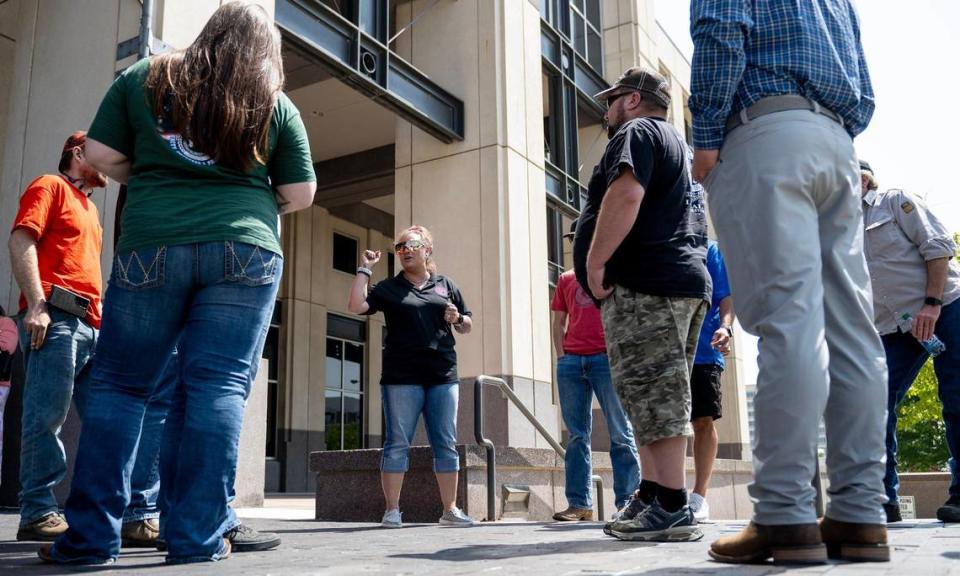Federal judge leaves Boilermakers president in power for now, but battle far from over
- Oops!Something went wrong.Please try again later.
The case of the dueling Boilermakers presidents landed in a federal courtroom Tuesday, but when the dust settled, the question of who controls the Kansas City, Kansas-based union remained unresolved.
At the conclusion of an intense hearing, Chief Judge Eric F. Melgren, of the U.S. District Court for the District of Kansas, issued a preliminary injunction that keeps International President Newton Jones in power for at least another month. But the judge also placed restrictions on the longtime union president that are designed to keep his spending in check.
The union’s infighting became public earlier this month when its top executives voted to remove Jones over allegations of misusing union funds for personal gain. Since then, there’s been an ongoing battle over who is in control.
On Tuesday, Melgren ordered a stay of the actions by the union’s executive council to oust Jones as president and the council’s decision last week to elect retired international vice president Warren Fairley to replace Jones.
But Melgren also ordered that any efforts to remove the executive council members from office for expelling Jones be stopped. And he said that Jones’ recent action to remove them from other appointments, such as committees and trust funds, would be stayed, saying it was clearly done in retaliation for the officers ousting him.
Melgren called for another hearing in about 30 days to determine whether Jones should remain in power.
“This is a matter that still needs to be addressed promptly,” he said. “I’m freezing the matter, but this has got to be a short-term freeze.”
He said that until the next court hearing, he was returning things to the way they were “prior to this dustup having occurred.”

The judge was irritated that Jones didn’t show up for Tuesday’s hearing.
“The court frankly finds it a personal affront that Mr. Jones didn’t even bother to attend the hearing,” he said, calling it disrespectful. He noted that “these charges against Mr. Jones are quite serious. And they don’t appear to be just vague allegations.”
Executive council’s actions
The allegations against Jones went public after three members of the union’s executive council — Tom Baca, of California; Arnie Stadnick, of Canada; and Timothy Simmons, of Alabama — signed a decision June 1 to remove Jones from office. The council ruled that Jones had violated a section in Article 17 of the Boilermakers’ constitution that deals with the misappropriation of funds.
Another executive council member, John Fultz, of New York, was not eligible to participate in the decision because he filed the internal disciplinary charges against Jones that led to his removal. The council’s fifth executive council member, Lawrence McManamon Sr., of Ohio, did not attend the hearing at which the decision was made, nor did he vote to remove Jones. The executive council is composed of the union’s five international vice presidents and Jones.

All five of the vice presidents attended Tuesday’s hearing.
The union’s executive council found that Jones ordered the union to give his wife, Kateryna, more than $100,000 plus benefits in back pay “for apparently no union purpose while she was living in the Ukraine” and spent more than $20,000 in union funds for flights to Ukraine “to visit his wife and to go to the home which he owns in the Ukraine.”
Jones and his wife also turned in about $40,000 in receipts for meals for them and other family members when at their home in North Carolina — some “quite lavish and expensive” — with no justification for the expenses, the executive council found.
Jones, 69, has denied misusing union funds and said the executive council had no authority under the union’s constitution to dismiss him. Since then, he has refused to step down.
The union represents about 46,000 workers in the United States and Canada who assemble, install and repair boilers, fit pipes and build power plants and ships.
As part of his injunction Tuesday, Melgren ordered that Jones turn in his union credit cards, be restricted from traveling outside the United States and Canada and be prohibited from using union funds to purchase meals for staff.
During the hearing, Melgren wanted to know what Jones’ wife did for the union. The union’s attorney, Michael Amash, said she was a special assistant to Jones.
“What’s her salary level?” the judge asked. He appeared surprised when the executive council’s attorneys said it was $165,000.
Judge asks where Jones is
The hearing got off to a rocky start for Amash, an attorney with Blake & Uhlig, the union’s longtime law firm. Melgren asked whom he was representing in the case. When Amash said he represented the union, the judge asked how the union’s law firm could be involved in suing its own executive council.
Melgren wondered if Amash had a conflict of interest because he was representing the union and not Jones. Then he chastised the attorneys representing Baca, Stadnick and Simmons for not raising the issue.
The judge also wanted to know where Jones was.
“I’m quite astonished that Mr. Jones isn’t present,” he said. “Why is that?”
Amash said he hadn’t consulted with Jones and didn’t know.
“It leaves me puzzled as to who represents Mr. Jones, who didn’t even bother to show up,” Melgren said.
The case ended up in federal court in Kansas City, Kansas, after the union filed a civil suit against Baca, Stadnick and Simmons, requesting a temporary restraining order and then an injunction to prohibit Jones’ removal. Though the lawsuit was filed by the union, many members say it doesn’t represent their feelings and they want no part of it.
On Thursday, the union executives fought back, filing a counterclaim against Jones, his wife and International Secretary-Treasurer William Creeden. They asked the court for a temporary restraining order followed by an injunction enforcing their decision to remove Jones.
“The public good is not served by allowing corrupt Union leaders to consolidate power and stay in office indefinitely particularly in light of efforts of the democratically elected leadership to remove him,” the counterclaim said.
The document alleged that Jones misappropriated hundreds of thousands of dollars from the union and its members. But instead of putting a stop to the practice, it said, Creeden authorized the transactions. And because Baca, Stadnick, Simmons and Fultz participated in the internal disciplinary process that led to Jones’ ouster, the suit said, Jones has “engaged in a campaign of retaliation” against them.

In addition to filing the lawsuit, the court document said, Jones was threatening to expel the four from the union “at an upcoming sham disciplinary hearing — merely because they enforced the IBB Constitution and tried to hold Mr. Jones accountable.”
Jones limited their travel, the document said, and removed them from long-held appointed leadership positions. And he filed internal disciplinary charges against Baca, Stadnick, Simmons and Fultz, accusing them of violating the union’s constitution. The men were recently sent a notice of an upcoming hearing on the issue, saying it was to be held Wednesday at a hotel on the Country Club Plaza. But that hearing is now on hold because of the judge’s injunction.
The union executives also filed documents last week that they say back their findings of Jones’ “shocking misuse of Union funds,” including a 282-page affidavit by Simmons that contains copies of credit card receipts and statements from airlines, hotels and restaurants along with emails sent among union officials.
Simmons’ affidavit described a conference in February on Marco Island, Florida, during which it said union executives learned of a Justice Department investigation into Jones and Creeden. According to the affidavit, members of the union’s executive council, along with Creeden, Jones’ wife, various other staff members and three union attorneys attended a meeting called by Jones before the conference began.
“We were informed at that time that there was an investigation by the Department of Justice alleging financial misconduct on the part of Mr. Jones and Mr. Creeden,” it said. “During that meeting, Mr. Jones admitted that he had used union funds for the purpose of traveling to Ukraine with his wife to visit the Ukraine.”
“I was shocked and surprised by these revelations,” Simmons’ affidavit said. “To my knowledge, the Boilermakers do not have any membership in Europe and travel to the Ukraine serves no union purpose. Consequently, I was shocked that significant sums of money were spent by the Boilermakers for Mr. Jones’ personal travel.”
At Tuesday’s hearing, Amash disputed the claim that Jones and Creeden were targets of a federal grand jury investigation into financial misconduct.
After returning home, Simmons said in the affidavit, he further investigated the claims of financial misconduct, and “further information about Jones’ financial misdeeds came to light.”
A review of credit card statements of Jones and his wife revealed “excessive amounts of Boilermakers funds being used for purposes that did not appear to benefit the Union whatsoever, such as miscellaneous iTunes charges, meals, etc.,” Simmons said.
“...Also, I was able to review payments made to assist his wife in gaining a visa for a trip to Australia for $613.98 on Sept. 8, 2016, and a Grand Canyon Sunset Helicopter Tour with Dinner for his wife, himself and others on July 22, 2016, at a cost of $5,999.88.”
Simmons also noted a substantial pay increase for Kateryna Jones in February, from $104,000 to $165,000.
Union members rally at courthouse
Prior to Tuesday’s hearing, about three dozen rank-and-file boilermakers — some traveling from across the country — rallied in support of the executive council’s action to remove Jones. Many carried posters of Jones that said, “Not My President.”
“I’ve been fighting this corrupt system for 20 years,” said Jim Martin, of Paton, Iowa, a member of the Kansas City-based Boilermakers Local 83. “But they know they can’t be touched. I’m hoping the FBI comes in and does a complete investigation and starts cleaning house.”
Bill Fargher, of Local 60 in Illinois, rode his motorcycle from Chicago to attend the hearing.
“I’m backing Newton Jones’ removal,” he said. “I’ve got a year-and-a-half to go, and I’m tired of it. He thinks he’s untouchable and doesn’t have to account for anything.”

Darrell and Jessie Manroe, of Grand Junction, Colorado — both members of Local 83 — drove 15 hours on Monday to attend the hearing.
“We’re fed up with what’s been going on,” Darrell Manroe said. “For the 20 years Jones has been in office, he’s been using our union funds for his play money. We’re over it. And we’re ready for a change.”

